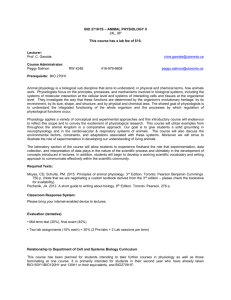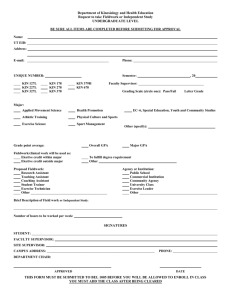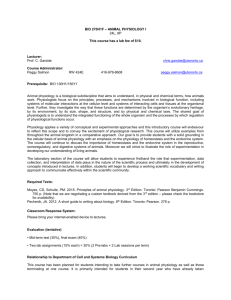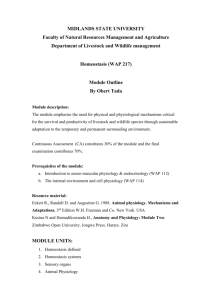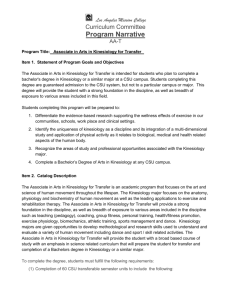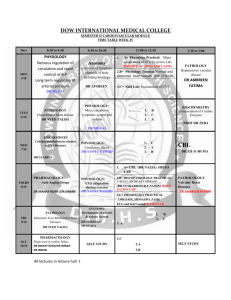Biomed FPP - Faculty of Applied Sciences
advertisement
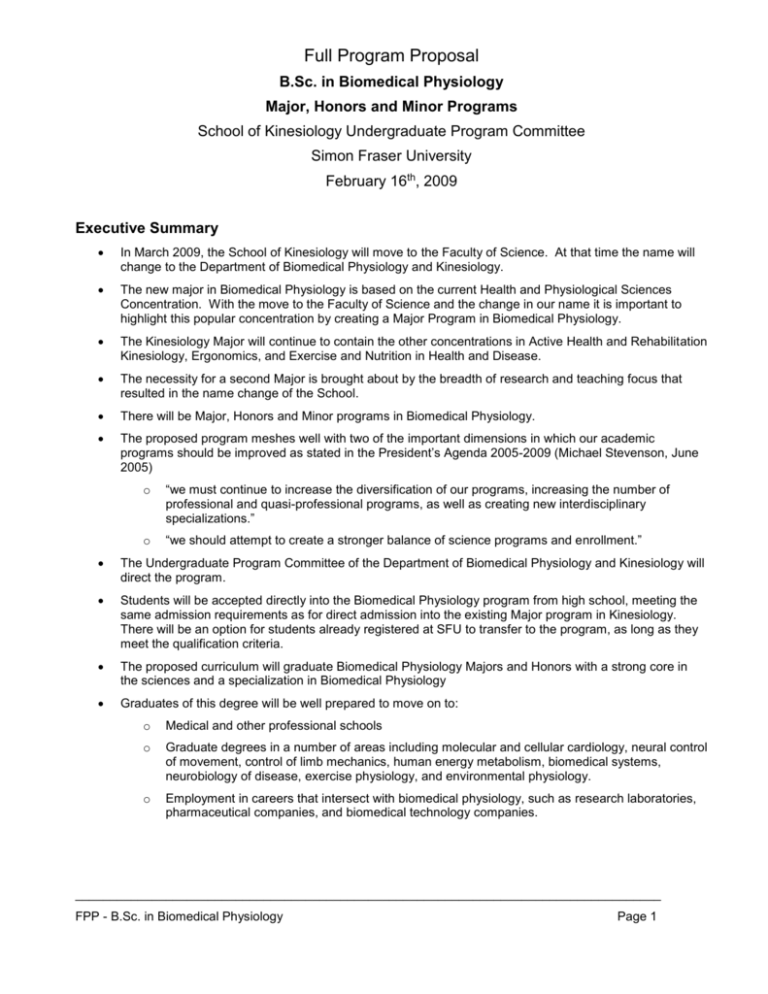
Full Program Proposal B.Sc. in Biomedical Physiology Major, Honors and Minor Programs School of Kinesiology Undergraduate Program Committee Simon Fraser University February 16th, 2009 Executive Summary In March 2009, the School of Kinesiology will move to the Faculty of Science. At that time the name will change to the Department of Biomedical Physiology and Kinesiology. The new major in Biomedical Physiology is based on the current Health and Physiological Sciences Concentration. With the move to the Faculty of Science and the change in our name it is important to highlight this popular concentration by creating a Major Program in Biomedical Physiology. The Kinesiology Major will continue to contain the other concentrations in Active Health and Rehabilitation Kinesiology, Ergonomics, and Exercise and Nutrition in Health and Disease. The necessity for a second Major is brought about by the breadth of research and teaching focus that resulted in the name change of the School. There will be Major, Honors and Minor programs in Biomedical Physiology. The proposed program meshes well with two of the important dimensions in which our academic programs should be improved as stated in the President’s Agenda 2005-2009 (Michael Stevenson, June 2005) o “we must continue to increase the diversification of our programs, increasing the number of professional and quasi-professional programs, as well as creating new interdisciplinary specializations.” o “we should attempt to create a stronger balance of science programs and enrollment.” The Undergraduate Program Committee of the Department of Biomedical Physiology and Kinesiology will direct the program. Students will be accepted directly into the Biomedical Physiology program from high school, meeting the same admission requirements as for direct admission into the existing Major program in Kinesiology. There will be an option for students already registered at SFU to transfer to the program, as long as they meet the qualification criteria. The proposed curriculum will graduate Biomedical Physiology Majors and Honors with a strong core in the sciences and a specialization in Biomedical Physiology Graduates of this degree will be well prepared to move on to: o Medical and other professional schools o Graduate degrees in a number of areas including molecular and cellular cardiology, neural control of movement, control of limb mechanics, human energy metabolism, biomedical systems, neurobiology of disease, exercise physiology, and environmental physiology. o Employment in careers that intersect with biomedical physiology, such as research laboratories, pharmaceutical companies, and biomedical technology companies. ____________________________________________________________________________________ FPP - B.Sc. in Biomedical Physiology Page 1 Background In March 2009 the School of Kinesiology will move into the Faculty of Science renamed as the Department of Biomedical Physiology and Kinesiology. The justification for the change in name was that Kinesiology alone did not reflect the current spectrum of research and teaching in the School. So too at the undergraduate level, the name of the Major in Kinesiology does not adequately describe the breadth of education that can be achieved in the program. In 1990’s, a concentration in Health and Physiological Sciences was developed recognizing this breadth. However, being a concentration within the Kinesiology major limits the development of this area because of ties to courses that are required for Kinesiologists but that might not be deemed necessary for Biomedical Physiologists. Having a separate Major in Biomedical Physiology releases these ties to inappropriate required courses, and meets the desire to be more interdisciplinary, by including more required courses from Biological Sciences, Chemistry and Molecular Biology and Biochemistry. It is anticipated that once the new program is running successfully, there would be further subdivision into concentrations in Cellular & Molecular Physiology, and Systems Physiology. It can be reasonably expected that the number of students drawn to the new Major will exceed the numbers of students currently drawn to the existing concentration of Health and Physiological Sciences within the Kinesiology Major. 1. Credential to be awarded: BSc in Biomedical Physiology or BSc (Honors) in Biomedical Physiology. Minor in Biomedical Physiology. 2. Location: SFU, Burnaby Campus 3. Faculty/Department/School offering the new program: Faculty of Science/ Department of Biomedical Physiology and Kinesiology 4. Anticipated program start date: September 2009 5. Description of proposed program: a) Aims, goals, and/or objectives The intent of this proposal is to focus the considerable Biomedical Physiology expertise in the Department of Biomedical Physiology and Kinesiology to allow for a broad and comprehensive undergraduate education in an area that is different than the existing Major in Kinesiology. The new program will require minimal new resources and will be more interdisciplinary, requiring more bioscience, chemistry and molecular biology & biochemistry courses than the existing Kinesiology Major. b) Anticipated contribution to mandate and strategic plan of the institution The proposed program meshes well with several of the important dimensions in which our academic programs should be improved as stated in the President’s Agenda 2005-2009 (Michael Stevenson, June 2005) “we need to improve the mix of graduate student enrolment in our total activity.” The development of this major and the change in name are partly motivated by a desire to increase the profile of our research strength in biomedical physiology. We will train undergraduates for a career in research and attract students to a graduate program stream in biomedical physiology developed in parallel with this new major. “we must continue to increase the diversification of our programmes, increasing the number of professional and quasi-professional programmes, as well as creating new interdisciplinary specializations. “ The development of our new concentration in Surrey (exercise and nutrition in health and disease) fostered a close look at the professional certification of our majors. The creation of this new major in biomedical ____________________________________________________________________________________ FPP - B.Sc. in Biomedical Physiology Page 2 physiology, enables us to make our kinesiology major more applied, meeting the demands of professional certification bodies. Both major programs are now more focused, creating students that are better prepared for careers in their chosen discipline. “Third, we must successfully complete the undergraduate curriculum revisions now underway, thereby assuring higher quality undergraduate programmes across the board.” “we should attempt to create a stronger balance of science programmes and enrolment.” The creation of this new major allows these students to apply their studies more strategically towards medical school entrance, training for graduate school and careers in biomedical physiology. c) Target audience This is currently a popular concentration within the school. It is anticipated that the name change and new major will enhance this popularity. Current students are drawn to this program as an excellent preparation for medical1 and other professional schools and advanced degrees in a number of areas within biomedical physiology. With an undergraduate degree in Biomedical Physiology, entry-level careers are possible in biomedical research laboratories as technicians, in pharmaceutical or health product companies as marketing or sales representatives, as well as government public health programs. 1 Candidates should check the specific requirements of the individual medical schools to ensure that their program meets such requirements d) Content Major Program Lower Division (LD) Requirements : 45 Science + 9 Kin + 5 elective = 59 units Upper Division (UD) Requirements : 37 Kin + 6 other upper division + 3 UD electives = 46 University Breadth Requirement: 12 University Writing Intensive Requirement: 6 (3 included above) Total :120 Note: Students must obtain a grade of C- or higher in all required courses. Honors Program In addition to the requirements for the Major program the Honours program will require: Completion of two courses totaling 15 units KIN 497-3: Kinesiology Undergraduate Honors Thesis Proposal KIN 499-12: Kinesiology Undergraduate Honors Thesis Total: 132 units Minor Program ____________________________________________________________________________________ FPP - B.Sc. in Biomedical Physiology Page 3 Lower Division (LD) Requirements : 45 Science + 3 Kin = 48 units Upper Division (UD) Requirements : 7 Kinesiology required + 6 partially specified Kinesiology electives = 13 units Co-Operative Education : optional – administered through Biomedical Physiology and Kinesiology co-op coordinator. e) Delivery Methods – already in place, Lecture/Lab/Tutorial f) Linkages between learning outcomes and curriculum design g) Distinctive characteristics – This major is distinct from the Kinesiology major by requiring additional units in Biology (7), Chemistry (4) and Molecular Biology and Biochemistry (6). These requirements allow majors to procure the entry requirements for Medical school. In addition, it prepares them for upper division specialty courses in Biomedical Physiology. The Kinesiology major requires applied courses necessary for professional certification. Removing the kinesiology professional certification requirements from the Biomedical Physiology major allows for a more substantive education in the broader realm of biomedical physiology. h) Anticipated completion time : Four years for the major program. The Honors program is designed to be completed in one additional semester. i) Enrolment plan for the length of the program : Direct admission from high school and internal transfer. The admission requirements with be the same as for the Major in Kinesiology. There will be an option fro students already registered at SFU to transfer to the program, as long as they fulfill the qualification criteria. Initially, it is anticipated that approximately 25 students per academic year would be attracted to the program. j) Policies on student evaluation (degree requirements): As per general regulations of the University, the Faculty of Applied Sciences and the Faculty of Science. k) Policies on faculty appointment (minimum qualifications): Continuing faculty will hold a PhD or equivalent. l) Policies on program assessment : All academic units at SFU are subject to external review every six years. m) Level of support and recognition from other post-secondary institutions (including plans for admission and transfer within BC) and relevant regulatory or professional bodies As per SFU’s transfer credit procedures, students may transfer from BC colleges or universities to enroll into this program. There is no applicable regulatory or professional body in the Biomedical Physiology field in BC. ____________________________________________________________________________________ FPP - B.Sc. in Biomedical Physiology Page 4 n) Evidence of student interest and labour market demand Currently there are about 25 declared undergraduates in the Health and Physiological Sciences concentration in the school of kinesiology per academic year. The name change and highlighting of the program as a major are anticipated to increase attention to, and enrollment in this program. Changes to this program facilitate timely completion, meet medical school entry requirements, and create a more focused program, all of which should increase attraction and retention. o) Related programs at SFU and other British Columbia post-secondary institutions Program currently exists as the Health and Physiological Sciences concentration within a Kinesiology Major at SFU. Honours program in Physiology – Department of Cellular and Physiological Sciences UBC 6. Additional Information Required by SFU: a) Contact information for the faculty member responsible for program development Glen Tibbits, School of Kinesiology, Ryan Dill, School of Kinesiology, ryand@sfu.ca b) Summary of requirements for graduation (courses, project/thesis, etc.) Major Program A minimum of 120 units; 54 Lower Division requirements (45 General Science, 9 Biomedical Physiology and Kinesiology) 20 Lower Division electives including WQB requirements 37 Upper Division Biomedical Physiology and Kinesiology requirements 6 Upper Division Molecular Biology and Biochemistry requirements 3 Upper Division electives Honors Program A minimum of 132 units; Completion of the Major (120 units) plus successful completion of the thesis proposal and Honors thesis courses. Minor Program 48 Lower Division requirements (45 General Science, 3 Biomedical Physiology and Kinesiology) 7 Upper Division Biomedical Physiology and Kinesiology requirements 6 Upper Division partially specified Biomedical Physiology and Kinesiology electives c) Summary of resources (faculty members, space, and equipment) required to implement the program The programs can be accommodated with present courses and faculty. See http://www.lib.sfu.ca/about/collections/courseassessments/Index.htm for library report. ____________________________________________________________________________________ FPP - B.Sc. in Biomedical Physiology Page 5 This program currently exists as the Health and Physiological Sciences Concentration within the School of Kinesiology. With the change in our name to Biomedical Physiology and Kinesiology, we will highlight this concentration by creating the new major, Biomedical Physiology. d) Brief description of any program and associated resources that will be reduced or eliminated when the new program is introduced None ____________________________________________________________________________________ FPP - B.Sc. in Biomedical Physiology Page 6 Proposed Calendar description for Biomedical Physiology Major Application Procedure Students transferring to Biomedical Physiology and Kinesiology from another program at SFU should complete a program approval form available from the Biomedical Physiology and Kinesiology General Office or the department web site. Applications are due on the last day of the first week of each semester and reviewed for approval for the following term. Biomedical Physiology Major Program Requirements Please read descriptions of required courses before enrolling in the major or honors program (see “Kinesiology KIN” on page 433). The following is a summary outline of the general degree requirements for a bachelor of science. Lower Division Requirements Biochemistry MBB 222-3 Molecular Biology and Biochemistry MBB 231-3 Cellular Biology and Biochemistry 6 units Biological Sciences BISC 101-4 General Biology BISC 102-4 General Biology 8 units Chemistry CHEM 121-4 General Chemistry and Laboratory I CHEM 122-2 General Chemistry II CHEM 126-2 General Chemistry Laboratory II CHEM 281-4 Organic Chemistry I CHEM 282-2 Organic Chemistry II CHEM 286-2 Organic Chemistry Laboratory II 16 units Kinesiology KIN 142-3 Introduction to Kinesiology KIN 201-3 Biomechanics KIN 205-3 Introduction to Human Physiology 9 units Mathematics one of MATH 150-4 Calculus I with Review MATH 151-3 Calculus I MATH 154-3 Calculus I for the Biological Sciences plus one of MATH 152-3 Calculus II MATH 155-3 Calculus II for the Biological Sciences 6 units Physics one of PHYS 101-3 General Physics I PHYS 120-3 Modern Physics and Mechanics PHYS 125-3 Mechanics and Special Relativity PHYS 140-4 Studio Physics – Mechanics and Modern Physics plus one of ____________________________________________________________________________________ FPP - B.Sc. in Biomedical Physiology Page 7 PHYS 102-3 General Physics II PHYS 121-3 Optics, Electricity and Magnetism PHYS 126-3 Electricity, Magnetism and Light PHYS 141-4 Studio Physics – Optics, Electricity and Magnetism 6 units Statistics STAT 201-3 Statistics for the Life Sciences 3 units Total 54 units Upper Division Requirements The following courses are required of all majors and must each be completed with a grade of C- or higher. KIN 304W-3 Inquiry and Measurement in Kinesiology1 KIN 305-3 Human Physiology I KIN 306-3 Human Physiology II KIN 326-4 Functional Anatomy KIN 407-3 Human Physiology Laboratory 19 units MBB 321-3 Intermediary Metabolism and one of BISC 303-3 Microbiology BISC 329-4 Introduction to Experimental Techniques BISC 333-3 Developmental Biology BISC 357-3 Gene Cloning BISC 403-3 Current Topics in Cell Biology BISC 405-3 Cell Physiology BISC 431-3 Molecular Biotechnology MBB 308-3 Molecular Biology and Biochemistry Laboratory I MBB 309-3 Molecular Biology and Biochemistry Laboratory II MBB 322-3 Molecular Physiology MBB 323-3 Introduction to Physical Biochemistry MBB 331-3 Molecular Biology and seven of KIN 301-3 Biomechanics Laboratory KIN 310-3 Exercise/Work Physiology KIN 336-3 Microscopic Anatomy KIN 340-3 Active Health: Behavior and Promotion KIN 402-3 Mechanical Properties of Tissues KIN 412-3 Molecular and Cellular Cardiology KIN 415-3 Neural Control of Movement KIN 416-3 Control of Limb Mechanics KIN 420-3 Selected Topics I* KIN 421-3 Selected Topics II* KIN 422-3 Selected Topics III* KIN 423-3 Selected Topics IV* KIN 426-3 Neuromuscular Anatomy KIN 430-3 Human Energy Metabolism KIN 431-3 Environmental Carcinogenesis KIN 442-3 Biomedical Systems ____________________________________________________________________________________ FPP - B.Sc. in Biomedical Physiology Page 8 KIN 444-3 Cardiac Disease: pathophysiology and assessment KIN 446-3 Neurobiology of Disease KIN 448-3 Rehabilitation of Movement Control KIN 484-3 Altitude and Aerospace Physiology KIN 496-3 Directed Study I* KIN 498-3 Directed Study II* *must be selected topics courses in physiology 21 units and 3 upper division units from any Faculty Total 46 units Free and Partially Specified Electives A total of 20 elective units are required. These 20 units must include courses that will satisfy the University breadth requirements of six units each of designated humanities breadth (BHum) and social science breadth (B-Soc) and 3 units of lower division W. Please see www.sfu.ca/ugcr for more information. 20 units Total 120 units Biomedical Physiology Honors Program This program is for approved biomedical physiology majors who wish to pursue an advanced degree in biomedical physiology and kinesiology. Application Requirements Honors program application requires the following. • completion of a minimum of 60 units • a minimum CGPA of 3.00 • submission of a completed program approval form, along with the student’s most recent unofficial record, to the undergraduate advisor. Graduation Requirements To graduate with honors, the student must successfully complete • a minimum of 132 units, with a minimum of 60 upper division units of which at least 54 must be in biomedical physiology and kinesiology • completion of all biomedical physiology major program requirements • KIN 497 and KIN 499 • a minimum CGPA of 3.00 on all relevant measures (CGPA, upper division grade point average, biomedical physiology and kinesiology grade point average, biomedical physiology and kinesiology upper division grade point average) Note: honors students may count only one of either KIN 496 or 498 toward their 27 upper division elective biomedical physiology and kinesiology units. Biomedical Physiology Minor Program Application Requirements Approval in the Biomedical Physiology minor is based on the same requirements for approval as a Biomedical Physiology Major ____________________________________________________________________________________ FPP - B.Sc. in Biomedical Physiology Page 9 Program Requirements There is a maximum number of allowable transferable units that count towards the minor program from any other institution. Students complete all of Lower Division Requirements Biochemistry MBB 222-3 Molecular Biology and Biochemistry MBB 231-3 Cellular Biology and Biochemistry Biological Sciences BISC 101-4 General Biology BISC 102-4 General Biology Chemistry CHEM 121-4 General Chemistry and Laboratory I CHEM 122-2 General Chemistry II CHEM 126-2 General Chemistry Laboratory II CHEM 281-4 Organic Chemistry I CHEM 282-2 Organic Chemistry II CHEM 286-2 Organic Chemistry Laboratory II Kinesiology KIN 205-3 Introduction to Human Physiology Mathematics one of MATH 150-4 Calculus I with Review MATH 151-3 Calculus I MATH 154-3 Calculus I for the Biological Sciences plus one of MATH 152-3 Calculus II MATH 155-3 Calculus II for the Biological Sciences Physics one of PHYS 101-3 General Physics I PHYS 120-3 Modern Physics and Mechanics PHYS 125-3 Mechanics and Special Relativity PHYS 140-4 Studio Physics – Mechanics and Modern Physics plus one of PHYS 102-3 General Physics II PHYS 121-3 Optics, Electricity and Magnetism PHYS 126-3 Electricity, Magnetism and Light PHYS 141-4 Studio Physics – Optics, Electricity and Magnetism Upper Division Requirements Students must complete all of: KIN 305-3 Human Physiology I KIN 306-3 Human Physiology II KIN 324-4 Principles of Human Anatomy (or KIN 325-3 Basic Human Anatomy) Students must complete 6 additional upper division KIN units from the following list. (note that ____________________________________________________________________________________ FPP - B.Sc. in Biomedical Physiology Page 10 some classes may require additional pre-requisites) KIN 304W-3 Inquiry and Measurement in Kinesiology1 KIN 310-3 Exercise/Work Physiology KIN 336-3 Microscopic Anatomy KIN 402-3 Mechanical Properties of Tissues KIN 412-3 Molecular and Cellular Cardiology KIN 415-3 Neural Control of Movement KIN 420-3 Selected Topics I* KIN 421-3 Selected Topics II* KIN 422-3 Selected Topics III* KIN 423-3 Selected Topics IV* KIN 426-3 Neuromuscular Anatomy KIN 430-3 Human Energy Metabolism KIN 431-3 Environmental Carcinogenesis KIN 444-3 Cardiac Disease: pathophysiology and assessment KIN 446-3 Neurobiology of Disease KIN 448-3 Rehabilitation of Movement Control KIN 484-3 Altitude and Aerospace Physiology KIN 485-3 Human factors in the Underwater Environment KIN 496-3 Directed Study I* or KIN 498-3 Directed Study II* *must be selected topics courses in physiology A minimum GPA of 2.0 calculated over all biomedical physiology and kinesiology courses used to satisfy the requirements is required as well as a minimum upper division GPA of 2.0 calculated from those upper division biomedical physiology and kinesiology courses used to satisfy the requirements. Notes; Students cannot complete a major in Kinesiology and a minor in Biomedical Physiology. Students cannot complete a major in Biomedical Physiology and a minor in Kinesiology. Students cannot complete a double major in Kinesiology and Biomedical Physiology. Students cannot complete a double minor in Kinesiology and Biomedical Physiology. ____________________________________________________________________________________ FPP - B.Sc. in Biomedical Physiology Page 11


